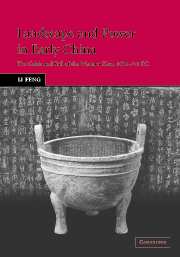Book contents
- Frontmatter
- Contents
- List of figures
- List of maps
- Acknowledgments
- Scholarly conventions
- Topographical map of China
- Chronology of Western Zhou kings
- The sixty-day circle
- Introduction
- 1 Foundation of the Western Zhou state: constructing the political space
- 2 Disorder and decline: the political crisis of the Western Zhou state
- 3 Enemies at the gate: the war against the Xianyun and the northwestern frontier
- 4 The fall of the Western Zhou: partisan struggle and spatial collapse
- 5 The eastward migration: reconfiguring the Western Zhou state
- 6 The legacy of the Western Zhou
- Conclusion
- Appendix 1 The periphery: the Western Zhou state at its maximum geographical extent
- Appendix 2 The relationship between the Quanrong and the Xianyun
- Appendix 3 The Bamboo Annals and issues of the chronology of King You's reign
- Bibliography
- Index to inscribed bronzes
- General index
Introduction
Published online by Cambridge University Press: 22 September 2009
- Frontmatter
- Contents
- List of figures
- List of maps
- Acknowledgments
- Scholarly conventions
- Topographical map of China
- Chronology of Western Zhou kings
- The sixty-day circle
- Introduction
- 1 Foundation of the Western Zhou state: constructing the political space
- 2 Disorder and decline: the political crisis of the Western Zhou state
- 3 Enemies at the gate: the war against the Xianyun and the northwestern frontier
- 4 The fall of the Western Zhou: partisan struggle and spatial collapse
- 5 The eastward migration: reconfiguring the Western Zhou state
- 6 The legacy of the Western Zhou
- Conclusion
- Appendix 1 The periphery: the Western Zhou state at its maximum geographical extent
- Appendix 2 The relationship between the Quanrong and the Xianyun
- Appendix 3 The Bamboo Annals and issues of the chronology of King You's reign
- Bibliography
- Index to inscribed bronzes
- General index
Summary
In the long Chinese tradition, the Western Zhou dynasty has been held in high esteem as the paradigm of political perfection and social harmony. More than once Confucius (551–479 bc) praised the Zhou institutions, and their founders King Wen, King Wu, and especially the Duke of Zhou, and it is no exaggeration that the entire Confucian tradition was centered on the core texts that were passed down from the Western Zhou period. There was, perhaps, a practical reason for Confucius' love for the Western Zhou dynasty: by his time the reported Xia dynasty, and even the Shang dynasty from which Confucius actually claimed his own ancestry, had already become largely unknowable owing, in the Master's own words, to a lack of historical documents. It was only about the Western Zhou dynasty that Confucius was apparently confident in recounting some historical details. True enough still today, the Western Zhou is the earliest time for which we can construct informed analyses of the political and social systems characterizing the early Chinese states, particularly because of the widely available written evidence from the period including both the transmitted texts and, to an even higher degree, the inscribed texts on bronze vessels. It is also the first dynasty whose historical development can be firmly and systematically linked to geographical settings on the basis of both written and archaeological records.
- Type
- Chapter
- Information
- Landscape and Power in Early ChinaThe Crisis and Fall of the Western Zhou 1045–771 BC, pp. 1 - 26Publisher: Cambridge University PressPrint publication year: 2006



